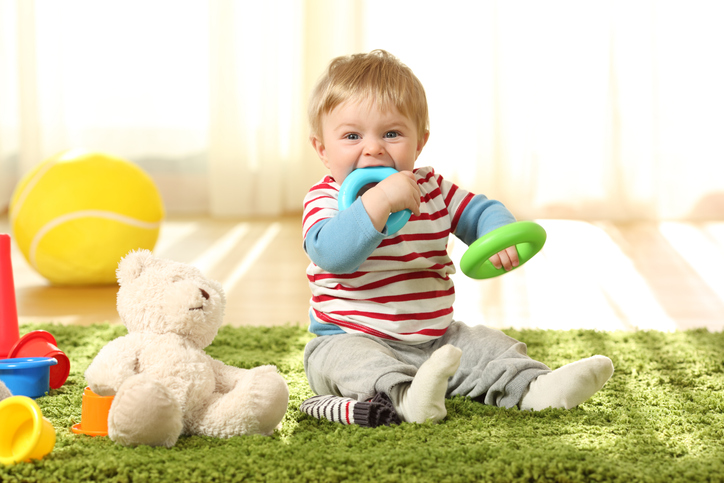Maybe you pick up your toddler from daycare and are greeted with the news that makes parents cringe, “Billy bit another child at lunch today”.
Or maybe you see your little one suddenly reach out and chomp an older brother or sister’s arm.
Yikes! What is going on? You’re going to need some tips for how to stop a child from biting, and fast!
Before you panic, know that biting is a pretty common behavior among toddlers. So you are definitely not alone.
Also know that there are some steps you can take to reduce and eventually end this aggressive behavior, once and for all.
Want to know how to stop a child from biting? Then read on…
Toddler Biting
First things first, if your child starts demonstrating this behavior don’t call him or her a “biter”. Ask teachers and caregivers to refrain from using that term also.
Putting labels like this on a child can actually reinforce the behavior, or get them ostracized from play groups, which only compounds the problem. This isn’t how to stop a child from biting.
Toddlers have limited language skills. They bite to cope with a frustration or to fill a need.
Children can bite for a variety of reasons, such as:
- They are overstimulated or their personal space is compromised,
- To satisfy a need for oral stimulation,
- They are stressed, anxious or mad, and don’t have the words to express these feelings, or
- They want more attention or active playtime.
Figuring out the underlying cause of your child’s biting will help you respond more effectively.
Related: How To Stop Whining Kids And Save Your Sanity
You want to know how to stop a child from biting? Start paying attention to when the biting occurs and see if there are any commonalities:
Is it when your toddler is tired? When they’re with a specific person? When another child takes a toy away from them or gets too close?
Knowing your toddler’s biting triggers can help you identify when they might bite again.
How To Stop A Child From Biting
When I See My Child Biting…
Follow this four step process when you witness your child biting someone.
1. Stay Calm
As with most behavior issues, yelling doesn’t help solve the problem. It’s not how to stop a child from biting.
Instead keep calm and focus on the behavior you witnessed.
2. Tell Them The Behavior Is Unacceptable
Say “we don’t do that” in a firm tone.
You may also want to talk about how the other child is feeling, “Mark is crying because you bit him. Biting hurts.”
3. Time-Out or Redirect
Put the biter on a short time out (1-2 minutes). If they’re too young for a time-out, redirect them to another area or activity.
4. Focus Attention On The Bitten Child
Your biter may be seeking attention, and negative attention still counts as attention.
So if you spend too much time focusing on the biter, you might reinforce the behavior.
Related: How To Handle Temper Tantrums In Toddlers
Shift your focus instead to the bitten child. Make sure they are okay, and offer sympathy and comfort.
The biter will begin to see that their actions won’t get them the attention they crave.

When I See My Child On The Verge Of Biting…
Follow this four step process when you notice your child is being triggered and seems on the verge of biting.
1. Distract and Redirect
Step in before the situation escalates and redirect your child to a less frustrating activity. This is how to stop biting in its tracks.
2. Offer Alternatives
If your child is triggered by a particular action, you can show your child another way to handle the situation.
“Ben, you can tell Sandy that she is too close to you and you don’t want her touching you.”
3. Teach Sharing Skills
Not sharing is one of the most common biting triggers.
Want to know how to stop a child from biting? Teach them ways to share other other kids.
Maybe ask them to play with another toy and then switch. Or set a timer so they know that both kids get equal time with a toy.
4. Try A Book
There are several good children’s books out there on the topic of biting.
Your child may respond to a lesson when it’s presented in story form. Some titles to consider:
- Teeth Are Not For Biting, by Elizabeth Verdick (age 2-3 years)
- Don’t Bite Your Friends! (Yo Gabba Gabba!), by Lisa Rao (age 2-6 years)
Lastly, don’t give up hope!
As kids become more verbal and acquire language skills (age 3-4), they can tell others what’s bothering them and won’t feel the need to bite in order to vent their frustrations.
In other words, it’s just a phase.
But if your child continues biting into their preschool years, it could be a warning sign that something more serious is going on.
Your child may have a tactile dysfunction (where they respond negatively to touch) or another underlying issue.
Talk to your doctor if it continues to be a problem. You can work together to determine how to stop a child from biting, once and for all.
Also In Beenke: The Secret To Raising A Confident Child
SHARE how to stop a child from biting on Facebook and Pinterest by clicking the buttons below.












